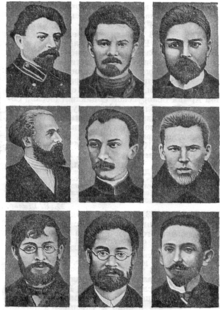
The 1st Congress of the RSDLP (Russian: Российская социал-демократическая рабочая партия, РСДРП) was held between 13 March – 15 March (1 March–3 March O.S.) 1898 in Minsk, Russian Empire (now Belarus) in secrecy. The venue was a house belonging to Rumyantsev, a railway worker on the outskirts of Minsk (now in the town centre). The cover story was that they were celebrating the nameday of Rumyantsev's wife. A stove was kept burning in the next room in case secret papers had to be burnt.
Proceedings

The Congress was convened by three major social democratic groups from different areas of the Russian Empire.
- The Saint Petersburg-based League of Struggle for the Emancipation of the Working Class, which had been active since 1895. The future founder of Menshevism Juliy Martov and the future founder of Bolshevism Vladimir Lenin were among its leaders in 1895–1896. Although one of the oldest in the Empire, this group could not play a significant role since it had been recently weakened by arrests.
- The General Jewish Labour Bund, which had united Yiddish speaking social democrats in the Pale of Settlement in September 1897. At the time, the Bund was the largest socialist group in the Empire and sponsored the Congress.
- The social democratic organization formed in 1897 around the Kiev-based Rabochaya Gazeta (Workers' Newspaper).
There were 9 delegates to the Congress representing these three groups as well as social democrats from Moscow and Yekaterinoslav. The Kharkov socialists refused to come thinking the move premature.
There were 6 sessions, with no minutes taken because of the need for secrecy; only resolutions were recorded. The major issues discussed by the delegates were merging all social democratic groups into one party and selecting the party's name. The Congress also elected a Central Committee of three: Stepan Radchenko, one of the oldest Russian social democrats and a leader of the Saint Petersburg League, Boris Eidelman of Rabochaya Gazeta and Arkadi Kremer, a Jewish Bund leader. The Manifesto of the new party was written by Peter Struve at Radchenko's request.
The Central Committee elected by Congress printed the Manifesto and the resolutions of the Congress, but five of the nine delegates were arrested by the Okhrana within a month.
The first Congress failed to unite the Russian Social Democracy, neither through the proposed Statutes nor the Programme. A wave of police repression followed, which prevented the party from functioning as a cohesive body for several years and ushered in a period of internal schisms and dissension. Three of the delegates weren't arrested, but only because Zubatov thought they would lead him to other members. It was not until 1903 that the 2nd Congress of the RSDLP was held abroad and adopted the party's Charter and Programme.
Central Committee
| Name | Cyrillic | 2nd CC | Birth | Death | Ethnicity | Portrait |
|---|---|---|---|---|---|---|
| Boris Eidelmann | Борис Эйдельман | Arrested | 1867 | 1939 | Jewish | 
|
| Arkadi Kremer | Иосиф Дубровинский | Arrested | 1865 | 1935 | Jewish | 
|
| Stepan Radchenko | Степан Радченко | Arrested | 1869 | 1911 | Russian | 
|
Notes
- See Leopold H. Haimson. The Making of Three Russian Revolutionaries, Cambridge University Press, 1987, ISBN 0-521-26325-5, p.461
- See Israel Getzler. Martov: A Political Biography of a Russian Social Democrat, Cambridge University Press, 1967, pp.18–20
- See Leopold H. Haimson. Op.cit. p.468
- For example, RSDLP membership in ethnically Russian areas in early 1905 was estimated at 8,400. Bund membership in mid-1904 was estimated at 23,000. Data from Bol'shaya Sovetskaya Entsiklopediya, vol. III, col. 98; ibidem, vol. XI, col. 531, quoted in Leonard Schapiro. "The Role of the Jews in the Russian Revolutionary Movement", in Slavonic and East European Review, 40 (1961–1962): 167, reprinted in Essential Papers on Jews and the Left, ed. Ezra Mendelsohn, New York University Press, 1997, ISBN 0-8147-5571-2, p.321
- See Israel Getzler. Op.cit., p.30
- See A Documentary History of Communism in Russia: From Lenin to Gorbachev, ed. Robert V. Daniels, Hanover, NH, University of Vermont, Published by University Press of New England, 1993, ISBN 0-87451-616-1, p.4
- ^ Woods, Alan (3 March 2017) . "History of the Bolshevik Party: Bolshevism – The Road to Revolution". In Defence of Marxism. International Marxist Tendency. Retrieved 12 March 2019.
- Whose original name was Alexander Kremer. See Jonathan Frankel. Prophecy and Politics: Socialism, Nationalism, and the Russian Jews, 1862–1917, ISBN 0-521-26919-9, Cambridge University Press, 1981, p.669
- See A Documentary History of Communism in Russia: From Lenin to Gorbachev, op. cit., p.4
- THE CAMBRIDGE HISTORY OF RUSSIA, Volume II – Imperial Russia, 1689–1917 page 645
- "Центральный Комитет, избранный I-м съездом РСДРП 3(15).3.1898, члены" [Central Committee elected by the First Congress of the RSDLP 3(15).3.1898, members]. Knowbysight.info. Archived from the original on 28 May 2022. Retrieved 21 May 2022.
- "Центральный Комитет, избранный II-м съездом РСДРП 10(23).8.1903, члены" [Central Committee elected by the II Congress of the RSDLP 10(23).8.1903, members]. Knowbysight.info. Archived from the original on 28 May 2022. Retrieved 28 May 2022.